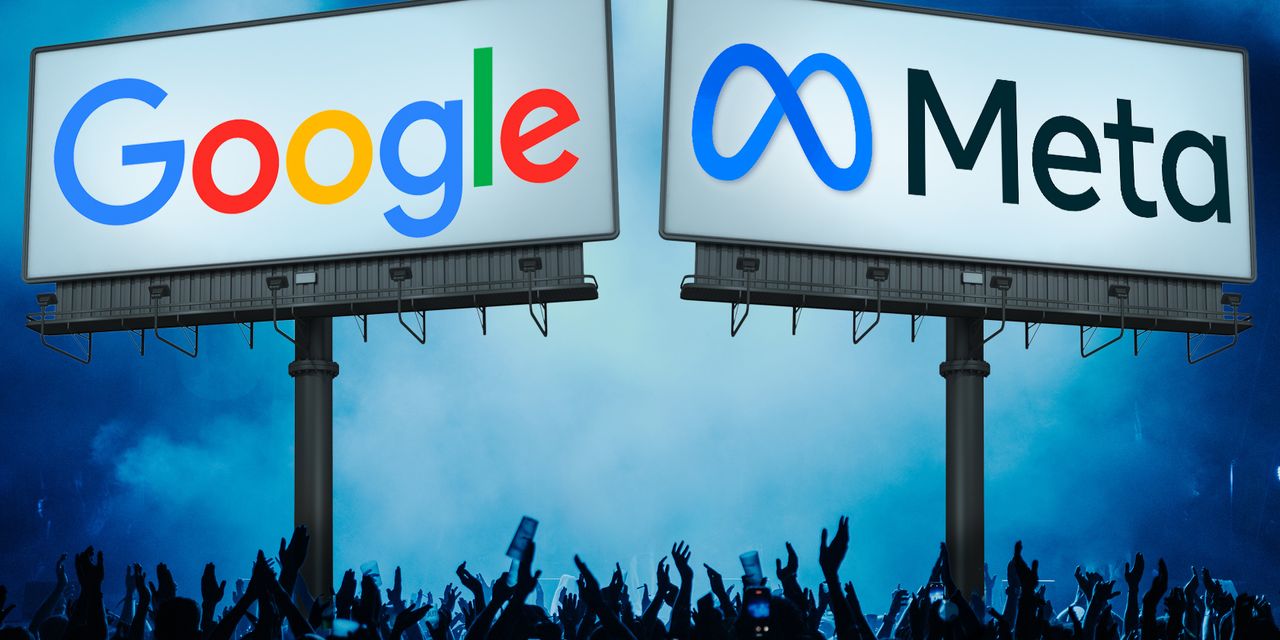There are two certainties in the tech world when it comes to digital advertising: Google and Meta. And then there’s everyone else.
Through economic thick and thin, Google and Meta are the gold standards by virtue of broad reach (billions of people globally), product dominance (in search and social media, respectively) and in their positions in the lightning-fast AI race. This week’s earnings results for Alphabet Inc.
GOOGL,
GOOG,
and Meta Platforms Inc.
META,
proved that emphatically once again.
Both companies rebounded from recent wobbly digital ads sales of their own through gigantic consumer reach and aggressive plans to parlay AI into ad sales. Google has developed (or dabbled) in some form of AI for at least seven years, and in a conference call with analysts Wednesday, Meta Chief Executive Mark Zuckerberg said his company will focus in the near term on AI to develop agents, ad features in existing products like Instagram and Reels, and internal productivity and efficiency. “We want to scale them, but they are hard to forecast,” he admitted.
Read more: Meta’s stock jumps after AI, ad momentum drive earnings and revenue higher
And: Alphabet earnings push stock up 6%, fueled by strong ad sales and strides in AI
Conversely, for companies consigned to the also-ran category, such as Snap Inc.
SNAP,
and X — the former Twitter — the news was bleak. Snap forecast disappointing third-quarter sales amid a spending push to draw advertisers.
“We continue to believe it will take multiple quarters of improved execution for many investors to get more comfortable with the story longer term,” JP Morgan analysts said in a note on Snap earlier this month.
Digital-advertising leader Google sought to remind everyone it has been doing AI a long time while Microsoft Corp.
MSFT,
a major investor in ChatGPT pioneer OpenAI, tempered its approach, Josh Wetzel, chief revenue officer at OneSignal, said in an interview. “AI’s greatest immediate value may be for Facebook advertising,” he said, pointing to it as an efficient and effective tool after Facebook encountered issues with data-privacy changes Apple Inc.
AAPL,
made to mobile devices.
Read more: Alphabet earnings remind Wall Street of Google’s AI prowess
“Meta’s solid quarter adds further evidence to the view that advertisers are choosing to spend their budget on the so-called market leaders, such as Facebook and Instagram, at the expense of the smaller social-media networks, like Snap,” said Jesse Cohen, senior analyst at Investing.com.
Jon Oberlander, executive vice president of social at digital-marketing agency Tinuiti, added: “It is, to some extent, still Meta/Google’s game, especially for performance advertisers, as the ROI and scale advertisers can find in the mid-lower funnel gap above other platforms.”
At the same time, Forrester analyst Kelsey Chickering said linear television ad revenue will slow between now and 2027 to about $65 billion from $70 billion as traditional TV continues to lose the under-25 crowd that has fled to streaming services and creator-heavy platforms like Snapchat and TikTok.
Digital advertising is on track to grow in the high single digits, or more, in 2023, slightly ahead of June’s forecast estimates from GroupM and Magna of around 8% each, according to Brian Wieser, head of Madison and Wall, a media and advertising consultancy for investors.
Most of that growth will benefit Google, Meta, and Microsoft’s LinkedIn, according to data from Emburse. Conversely, Emburse found ad spending on Twitter/X has plunged 54% from a year ago in May, before Elon Musk bought the company.
“Google, Meta and LinkedIn are platforms where people go to consume information, search for ideas, or give context to what they experiencing in their personal or work lives,” Emburse Chief Experience Officer Johann Wrede said.
While Alphabet CEO Sundar Pichai boasted Wednesday of “continued leadership in AI and our excellence in engineering and innovation are driving the next evolution of Search” and other services, as well as improved YouTube ad sales, Meta’s addition of potential X-killer Threads could dramatically inflate its ad sales going forward.
Zuckerberg sees potential in Threads long term despite a plunge in its user sign-ups because X is hemorrhaging advertising clients, and this week reportedly slashed ad costs to lure business customers.
“The launch of Threads holds great promise for Meta. While there are currently no ads on the app, it’s inevitable that they will come and the ability to use data from other Meta properties for targeting is a highly lucrative proposition for brands,” Aaron Goldman, chief marketing officer at Mediaocean, said in an email.
That translates to more near-term pain for smaller platforms such as Snap and X, which are posting negative growth, Michael Nathanson of SVB MoffettNathanson warned in a note Wednesday.
“The truth is that Alphabet started integrating machine learning and artificial intelligence into their products and ad solutions close to a decade ago,” he said. Snap and others are scrambling to catch up.
Read the full article here



